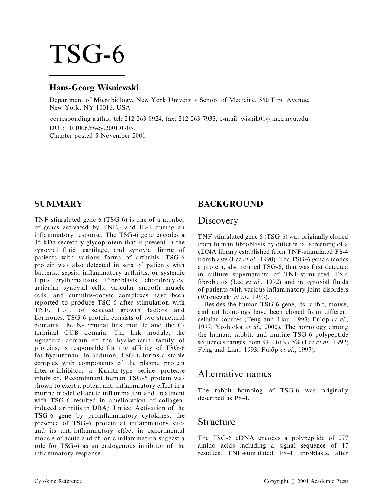Wisnicwski H.G.
TNF-stimulated gene 6 (TSG-6) is one of a number of genes activated by TNFα and IL-1 during an inflammatory response. The TSG-6 gene encodes a 35 к Da secretory glycoprotein that is present in the synovial fluid, cartilage, and synovial lining of patients with various forms of arthritis. TSG-6 protein was also detected in sera of patients with bacterial sepsis, inflammatory arthritis, or systemic lupus erythematosus. Fibroblasts, chondrocytes, articular synovial cells, vascular smooth muscle cells, and cumulus-oocyte complexes have been reported to produce TSG-6 after stimulation with TNF, IL-1, or selected growth factors and hormones. TSG-6 protein consists of two structural domains, the N-terminal link module and the C-terminal CUB domain. The link module, the signature domain of the hyaladherin family of proteins, is responsible for the affinity of TSG-6 for hyaluronan. In addition, TSG-6 forms a stable complex with components of the plasma protein inter-o-inhibitor, a Kunitz-type serine protease inhibitor. Recombinant human TSG-6 protein was shown to exert a potent anti-inflammatory effect in a murine model of acute inflammation and treatment with TSG-6 resulted in amelioration of collagen-induced arthritis in DBA/1J mice. Activation of the TSG-6 gene by proinflammatory cytokines, the presence of TSG-6 protein at inflammatory sites and its anti-inflammatory effect in experimental models of acute and chronic inflammation suggest a role for TSG-6 as an endogenous inhibitor of the inflammatory response. | |

Reviews
There are no reviews yet.